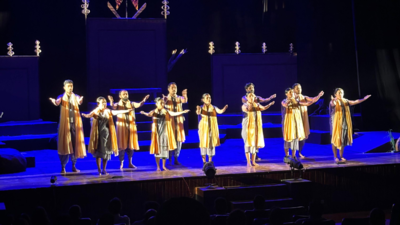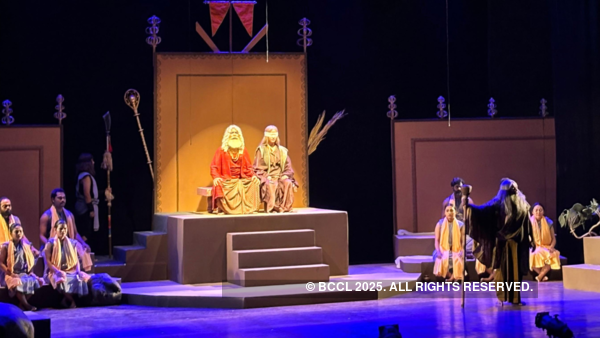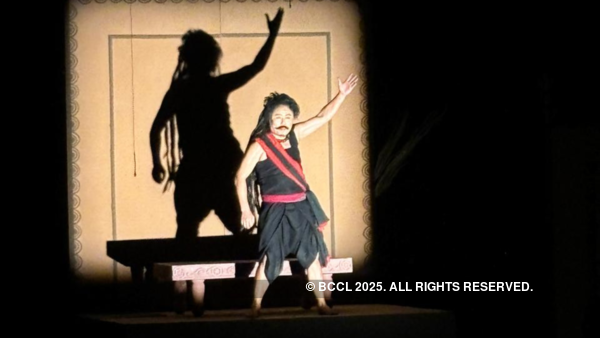Trending
Revisiting the last day of ‘Mahabharata’ war with Dharamvir Bharti’s ‘Andha Yug’
National School of Drama, Delhi organised a presentation of 'Andha Yug' directed by Prof. Ram Gopal Bajaj, a powerful play exploring themes of loss and dharma after the Mahabharata war.

'Andha Yug' by Dharamvir Bharti
On May 26 and 27, 2024, National School of Drama, Delhi organised a presentation of ‘Andha Yug’, written by Dharamvir Bharti and directed by Prof. Ram Gopal Bajaj.
‘Andha Yug’ is a powerful play set in the aftermath of the Mahabharata war and looks at the themes of loss, despair, and the complex nature of dharma practised by Shri Krishna. The play shows a world where morality and ethics have been shattered by the devastation of war.
The play begins with the harrowing imagery of the last day of the Mahabharata war.Vultures are all around the battlefield looking for possible dead men and food and as they circle the skies, the symbol of death and sadness increases all the more. With haunting music and cries, the sounds set a tone of mystery and sorrow.

Dhritarashtra, in contemplation, thinks about who truly won the war? With the widespread loss of life and the ethical compromises made during the war, it all left him wondering if anyone can be considered a winner.
Sanjay, who was given the boon and the bane of narrating the war's outcome, describes the terror and sorrow of having to convey the tragic news to the survivors.

The play also covers the ordeal and situation of Ashwatthama, the son of Drona, who was one of the war's last surviving warriors. His situation becomes one of mental turmoil after he sees how his father was killed with deceit and in a fit of rage he breaks his bow, symbolising his surrender to grief and rage. But, he also takes the pledge that he will ensure that the Pandavas experience the same fate.
When the news about Duryodhan’s death is sent out, Gandhari, usually an emotional figure, seems to be still as a stone, showing no emotion, almost like someone crushed her. But then, she confronts Krishna and curses him for his partiality, adharma, and manipulation during the war. She curses him that just like Hastinapur is now in dismay, his clan too will face a similar fate and He will die like an animal by a mortal no less. This curse actually came true later when Shri Krishna was killed by Jara, a hunter, who thought his moving feet were a deer.

But, after giving that curse, Gandhari was distraught for she only did so in a fit of rage.
Eventually, Ashwatthama uses the Brahmastra, a powerful weapon, which brings Ved Vyas into the picture as he explains the demolition that will now be faced by humanity and the universe. In the end, the play perfectly summarises the devastation caused by war and the blindness (both literal and metaphorical) of its participants.
‘Andha Yug’ is a powerful play set in the aftermath of the Mahabharata war and looks at the themes of loss, despair, and the complex nature of dharma practised by Shri Krishna. The play shows a world where morality and ethics have been shattered by the devastation of war.
The play begins with the harrowing imagery of the last day of the Mahabharata war.Vultures are all around the battlefield looking for possible dead men and food and as they circle the skies, the symbol of death and sadness increases all the more. With haunting music and cries, the sounds set a tone of mystery and sorrow.

Dhritrashtra and Gandhari in 'Andha Yug'
In between, the play features a discussion between Vidur and Dhritarashtra. Vidur, known for his wisdom, tries to console the blind king Dhritarashtra, a man who is now overwhelmed with grief and guilt and their conversation shows the nature of dharma, morality, and the consequences of one's actions. Gandhari, the mother of the Kauravas, adds another layer to this discussion. In her grief and anger, she describes dharma, neeti (policy), and dignity as mere pretences and questions their value when they lead to destruction on a wide scale.
Gandhari also blames Krishna for manipulating dharma to suit his purposes.
Dhritarashtra, in contemplation, thinks about who truly won the war? With the widespread loss of life and the ethical compromises made during the war, it all left him wondering if anyone can be considered a winner.
Sanjay, who was given the boon and the bane of narrating the war's outcome, describes the terror and sorrow of having to convey the tragic news to the survivors.

Contemplations of the last day
The play also covers the ordeal and situation of Ashwatthama, the son of Drona, who was one of the war's last surviving warriors. His situation becomes one of mental turmoil after he sees how his father was killed with deceit and in a fit of rage he breaks his bow, symbolising his surrender to grief and rage. But, he also takes the pledge that he will ensure that the Pandavas experience the same fate.
When the news about Duryodhan’s death is sent out, Gandhari, usually an emotional figure, seems to be still as a stone, showing no emotion, almost like someone crushed her. But then, she confronts Krishna and curses him for his partiality, adharma, and manipulation during the war. She curses him that just like Hastinapur is now in dismay, his clan too will face a similar fate and He will die like an animal by a mortal no less. This curse actually came true later when Shri Krishna was killed by Jara, a hunter, who thought his moving feet were a deer.

Ashwatthama pledging vengeance
But, after giving that curse, Gandhari was distraught for she only did so in a fit of rage.
Eventually, Ashwatthama uses the Brahmastra, a powerful weapon, which brings Ved Vyas into the picture as he explains the demolition that will now be faced by humanity and the universe. In the end, the play perfectly summarises the devastation caused by war and the blindness (both literal and metaphorical) of its participants.
End of Article
FOLLOW US ON SOCIAL MEDIA








